- Home
- Joan Lowery Nixon
Ellis Island: Three Novels Page 4
Ellis Island: Three Novels Read online
Page 4
“This is what you would like? To be a teacher?”
“Oh, yes! I would! I really would!” Rebekah answered. To be like Mordecai, to have such knowledge and to share it, and to be admired and respected as Mordecai was for sharing his knowledge—Rebekah could imagine nothing more thrilling.
For a moment Mordecai sat and thought. Then he raised his head and smiled at Rebekah. “Who knows what will happen in the New World?” he said, more to himself than to her.
At least he didn’t say my dream is impossible, Rebekah told herself.
Mordecai, with his friendliness and his command of languages, soon knew many of the travelers in steerage. He often served as translator and even peacemaker, and he continued to share nuggets of information with his family.
“Passengers in second and first class do not have to go through an examination at Ellis Island,” he said on the third evening at sea. “An inspector and doctor come to the ship, and the examination amounts to only a few questions. The officials believe that those who can afford to travel in first or second class have enough money to continue to support themselves in the United States without needing public assistance.”
“What is Ellis Island like?” Rebekah demanded.
Mordecai smiled. “Here is what I know: Ellis Island is a group of buildings large enough to hold thousands of people at one time. These buildings stand on an island in Upper New York Bay, across from Manhattan Island.”
“Another island?”
“Manhattan Island is covered with very, very tall buildings. This is New York City, the place where your Uncle Avir lives with his family. It’s where we all will live.”
“Is New York City like the city of Hamburg? So many houses?”
“It is larger,” Mordecai said, “and its buildings are taller … much taller … ten, fifteen, even twenty stories!”
Jacob interrupted by leaning over his bunk and gagging with dry heaves into the bucket his mother had appropriated and placed there.
“Rebekah!” Kristin shouted and waved from the stairway. “Come on deck! We are moving into the Liverpool harbor!”
Rebekah, her sympathy for her brother wearing thin, was glad to escape and join Kristin on deck.
Music from a string trio on the outdoor top deck fell like soft raindrops, and Rebekah lifted her face to catch every note. She could imagine the expensively dressed women in flowing gowns, dancing to the music and eating … well, who knew what wealthy women ate? Surely it wasn’t the bland watery stews that had been served to the steerage passengers day after day.
Kristin grabbed Rebekah’s hand and pulled her toward the railing. Lights sparkled along the shore, clustering ahead like a gathering of stars.
“We’re coming toward the harbor,” Kristin told her, “but I heard one of the ship’s officers say that the passengers wouldn’t board until tomorrow morning.” She giggled and said, “Let’s sleep outside on deck tonight, where we can see the lights and the stars.”
Rebekah looked at Kristin in surprise. “Will your father let you?”
“Once he goes to sleep he snores like a steam engine and hears nothing. I can slip outside, and neither my father nor mother will notice.”
Rebekah thought a moment. “Some of the men sleep outside, but I don’t think any of the women do.”
“One or two of the women have,” Kristin said.
“How do you know?”
“Last night I sneaked outside and took a look.”
Rebekah laughed, and for the first time felt bold enough to not worry about her mother’s rules. “Then let’s do it,” she said.
“Will you have to ask your parents’ permission?”
“I should,” Rebekah answered.
Kristin raised an eyebrow. “If you asked, they’d say ‘no.’ Am I right?” Rebekah nodded. “But if you don’t ask, then they cannot later say they have forbidden it!”
Rebekah lowered her voice. “I suppose that’s so,” she said slowly. But she couldn’t help grinning a little at Kristin’s clever logic.
What is happening to me? Rebekah wondered. I have always been an obedient and dutiful daughter, yet I’m thinking and saying and doing things I never would have thought of back home.
CHAPTER SIX
IT wasn’t just Kristin’s father who snored loudly. Snores came from every direction, reverberating throughout the hold, so between the noise and her nervousness over being caught Rebekah had no trouble staying awake until it was time to join Kristin on the upper deck.
Rebekah had waited her turn at the privy for women, trying to hold her breath while she was in the cramped, dirty, foul-smelling space. There were faucets of cold salt water along the outer wall of the room for washing, but the basins they emptied into were dirty. In one basin a woman was soaking soiled clothing. Another basin was crusted with dried vomit that had not been washed out. Rebekah tried to find the cleanest basin possible, then hurriedly rinsed her hands and face, her eyes stinging from the cold salt water.
Now she lay on her bunk, her jacket wrapped tightly around her as usual, until she heard Kristin’s whispered signal. Smothering their giggles, the girls tied their kerchiefs, tugged on their boots, and dropped quietly to the floor, taking their shawls and blankets with them. With the few ship’s lanterns to light the way, Kristin ran toward the stairway; but Rebekah stopped to look back and saw her brother Jacob watching her with mournful eyes. She dropped to her knees and put her lips close to his ear. “Come with us,” she said. “We’re going to sleep outside.”
Wearily, he shook his head, but Rebekah took a firm grip on his arm. “Come,” she said, tugging at her brother. “The ship isn’t moving, and the fresh night air will help you feel better.” She fumbled for his coat, which had been folded and laid over the end of his bunk. “And don’t make any noise!” she whispered.
Jacob, too weak and ill to disobey, did as Rebekah told him, and crawled from his bed. He straightened the tangled tassels of his tsitsith, which hung below his waist both front and back, bundled into his coat and scarf, and Rebekah pushed him ahead up the stairway and through the open hatch.
Kristin’s mouth opened with surprise as she saw Jacob, but before she had a chance to say anything, Rebekah stated, “Jacob needs to get away from that horrible stench.” And to her brother she said, “Now breathe deeply. Again … again.”
“I’ve found us a place,” Kristin said, but she glanced dubiously at Jacob before she led them forward to where a few other people had settled down on one of the closed hatch covers. Some of them smiled and nodded as Rebekah, Kristin, and Jacob joined them.
A man asked them something, but the three of them didn’t understand his language, so they shrugged and shook their heads.
“We’re from Russia,” Jacob said in Yiddish.
At the same time, Rebekah said in Russian, “Does anyone here speak Russian?”
And Kristin said in Swedish, repeating herself in English, “I’m from Sweden.”
A few people nodded recognition, and some shrugged and settled against each other, trying to find comfortable positions; but a tall, slender, dark-haired boy, who was probably only a year or two older than Rebekah, left the group. He waited until Rebekah had seated herself, then sat down next to her. Rebekah tried to squeeze over, closer to Kristin, but there was only so much room, and the three of them were wedged together.
“Good evening,” the boy said in Yiddish.
Rebekah tilted her head toward Kristin as she asked in his language, “Can you speak English?”
“Very little,” he answered.
“I don’t want to speak another language in front of my friend,” Rebekah told him.
“Very well … Rebekah,” he said in English.
Startled, she asked, “How do you know my name?”
The boy suddenly grinned and reached into the inside pocket of his jacket, pulling out a wooden flute. Without answering he put the mouthpiece of the flute to his lips. Soft notes tumbled out in a trill, followed by a sof
ter, slower tune that slowly wrapped around Rebekah’s shoulders like her woolen shawl, comforting and warm.
Around them voices murmured, then hushed, as the music cast its spell. Jacob sighed with pleasure and stretched out on the deck at Rebekah’s feet. With a smile on his face he placed his head on his hands and closed his eyes, and his breathing deepened. It was the first comfortable sleep that poor, seasick Jacob had enjoyed since the Levinskys had boarded the ship.
The boy continued playing, his music as coaxing as a smile, as gentle as a kiss. Kristin lay her head on Rebekah’s shoulder, and soon it was heavy with sleep.
Rebekah found it hard to keep her eyes open. She began to dream that the music floated away into the night, joining the stars in a melody that faded to a whisper and vanished into the heavens. In her dream her head rested against someone’s chest. His arm was snug around her shoulders, and his lips softly brushed her forehead.
The gray light of early dawn awoke Rebekah, and she sat up, confused, as she looked at the empty place next to her. Where was the boy with the flute? The one who knew her name but hadn’t told her his own? Blushing, she vividly remembered her dream. It had been just a dream, hadn’t it?
Kristin awoke and stretched, yawning widely. When she fully opened her eyes she looked around and asked, “Where is he?”
“Who?” Rebekah whispered.
“That boy with the flute. When did he leave?”
“I don’t know,” Rebekah said. She could still feel his arm around her shoulders and his lips against her forehead. It hadn’t been a dream. It had been real. Kristin was rubbing sleep from her eyes, and Rebekah was thankful that her friend couldn’t see the blush that reddened her cheeks.
Around the girls people were stirring as daylight awakened them. It was going to be another sunny day, cool and beautiful.
“Let’s sleep outside again,” Kristin said, “and maybe the boy with the flute will come back. He was good-looking, wasn’t he!” Kristin laughed knowingly, and Rebekah realized that Kristin hadn’t missed a thing.
Suddenly there was the sound of shoes clattering rapidly along the deck, and Rebekah’s mother came into view. Leah stopped short, one hand pressed against her heart, when she saw Rebekah and Jacob.
Oy vey, Rebekah thought.
“When I woke up and saw that you and Jacob were gone, my heart went into my throat!” Leah began. “We are in port. You could have been abducted from the ship. You were sleeping out here all night, weren’t you?” She pointed at Jacob. “Look at the poor boy—sleeping on the hard deck!”
“Mama,” Rebekah interrupted. “It is just as you said. Jacob is sleeping.”
“What?”
“He’s sleeping, and he has slept all night long. It’s the first time he’s been able to sleep since we boarded the ship.”
Jacob, his slumber disturbed by the familiar voices, awoke and struggled to a sitting position. He stretched and arched his back and smiled up at Leah. “Mama!” he said. “Rebekah told me that I’d be able to sleep if I came outside, and she was right.”
Leah bent to hold Jacob’s face, tilting it up to examine it as though she had never seen it before. “There’s color in your cheeks,” she said with amazement.
“I’m hungry,” Jacob said. “Is it time yet for food?”
As Leah stepped back and beamed, Kristin said in English, “Good morning, Mrs. Levinsky.”
“Good morning, Kristin,” Leah answered slowly and precisely in English.
Kristin hopped up, folding her blanket and tugging her shawl around her shoulders. “I’d better go below before my parents miss me,” she said, and raced toward the open hatchway.
Leah’s eyes narrowed as she studied the faces of those passengers who were on deck. “They are mostly men,” she said in shock.
Rebekah studied the faces, too, looking for the boy with the flute, but he was nowhere in sight. “Some of the women slept outside also,” she insisted. “Look, there are two of them.”
“But not as many women as there were men.”
“Mama, it’s all right.”
“Oh? Where is it written that it’s all right for a young girl to sleep outside, away from her family, in the company of strange men?”
Jacob got to his feet and put an arm around his mother’s shoulders. “Don’t scold Rebekah, Mama,” he said. “I was with her.”
“It still isn’t a proper thing to do.”
“Mama, think about it. Rebekah helped me sleep. For the first time since we left Hamburg I was able to sleep. You should be thanking her.”
Leah’s eyebrows rose in surprise, but she reached for Rebekah’s hand. “Thank you for helping Jacob, Rebekah. But this sleeping outside on deck is something we will have to discuss with your father.”
“I’ll be glad to talk to Papa,” Jacob said. “That hold smells like a garbage dump. No, even worse!”
“Well …,” Leah said with uncertainty, and Rebekah hoped the matter would end there. She never would be allowed to come on deck again to sleep if it weren’t for Jacob’s help. Jacob was a boy—almost a man—and his opinions were considered with respect, whereas Rebekah, being a girl … She sighed but thought again with wonder about what Kristin had told her of America.
Leah looked across the dock toward the city of Liverpool. “We have relatives in England,” she said.
“I’ve never heard about them. Who?” Rebekah asked.
“Cousins of Mordecai’s. They left our village many years before you were born. There are two of them—brothers.”
“Will we meet these cousins?”
“No,” Leah said. “There is not enough time. They live in London, much too far away.”
She turned toward the open hatch, but Rebekah continued to gaze toward the land. Relatives in England, relatives in America … Her close family life in the shtetl was rapidly enlarging.
Breakfast was a combination of dried herring and potatoes. Rebekah was hungry enough to wolf down the food. She sat on deck with her father, her empty plate on her lap, her tin cup of coffee cradled in both hands, and questioned him about their lives-to-be in the United States. But Elias, who had eaten very little of his meal, gave only noncommittal answers.
Rebekah tried to hide her impatience. “Papa,” she finally said, “don’t you know where we will live? Don’t you know what we’ll be doing?”
As he turned toward her, she could see the misery in his eyes, and she wished she had kept her questions to herself.
“No, Rebekah, I don’t know,” Elias said, his voice as firm and controlled as ever. “I have always led a simple life. I have worked hard as a tailor and taken pride in my work. On some occasions times have been very difficult, but I have always managed to provide for my family. Yet, here I am fleeing the czar’s soldiers by taking my wife and children to a country that is strange to me. We’ll live in a very large city, and I do not know yet how I will care for all of you.”
“But Uncle Avir said he would have a job for you, Papa, and tailors should have much more work in a city than in our shtetl … shouldn’t they?”
“I can only hope,” he answered.
Leah stepped up, putting a hand on her husband’s shoulder. “Life in the United States will be good for all of us,” she said firmly. She turned her gaze on Rebekah. “Don’t expect instant answers to all your questions, daughter. Life is a series of questions, and you’ll have to find your own answers for most of them.”
“I’m sorry,” Rebekah began, but her mother interrupted with a smile and a quick shake of her head.
“There is no need to be sorry. Here … as soon as your father has finished eating you can help by taking the dishes down to be washed.”
Elias quickly finished his meal and handed his dishes to Rebekah.
Rebekah took care of her chores quickly. During the rest of the morning she looked for the boy with the flute but was unable to see him in the horde of steerage passengers who crowded the deck. After the noon meal her attention was diverted by
the new people who had begun boarding the ship.
She and Kristin squeezed in among the others who were leaning on the rail of the main deck to watch stylishly dressed women walk up the gangplanks, escorted by their equally stylish male companions.
Rebekah nodded toward a woman in a narrow-waisted blue coat with silver buttons. “I would like to have a coat like that. Wearing it would make me feel beautiful.”
“You are beautiful,” a voice said, and Rebekah whirled to see the boy with the flute.
Rebekah quickly stared down at her shoes, unable to meet his eyes. “I am terribly embarrassed about last night,” she said. “Your music was lovely, and it soothed away our problems. It helped us all to fall asleep. And that’s where I …” She began again. “As I slept, if I accidentally happened to rest my head on your shoulder I apologize, because …”
She forced herself to draw on her courage and decided to face him, but when she looked again he was gone. Frantically, she scanned the crowd, but he was nowhere in sight.
CHAPTER SEVEN
SCRAMBLING back to Kristin’s side, Rebekah stammered, “Kristin! I saw the boy with the flute, and he talked to me again, but he disappeared.”
“He’ll be back,” Kristin said, her attention turned to something interesting. “Here come the steerage passengers.”
Rebekah watched the people who were being herded in a cluster along the dock toward the gangplank that led to the main deck. Most of the emigrants were young men, and there were only two families with children.
“How can they fit any more people down in the hold?” Rebekah murmured.
Behind a rope that a dockhand had stretched across the pier to keep out nonpassengers stood a woman with two little girls. One of the children seemed to be about Sofia’s age, the other only three or four years old. Both girls were sobbing. “Rosie! Don’t go! Rosie, don’t leave us!” The youngest screamed loudly, over and over.
In the midst of the group of emigrants, a tall girl in a faded dress and shawl, her bright red hair hanging free from under a skimpy kerchief, was crying heartbrokenly. Occasionally, as the line moved, she turned and waved to the little ones, trying to muster a smile, but the man with her gripped her arm and pulled her along with the crowd, which surged forward as the gangplank was opened to them.

 The Internet Escapade
The Internet Escapade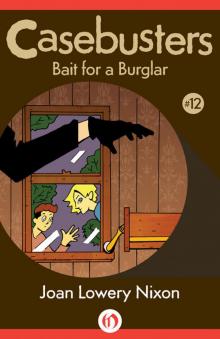 Bait for a Burglar
Bait for a Burglar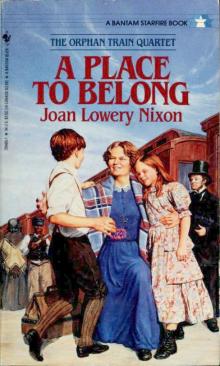 A Place to Belong
A Place to Belong Nightmare
Nightmare Sabotage on the Set
Sabotage on the Set The Other Side of Dark
The Other Side of Dark Whispers from the Dead
Whispers from the Dead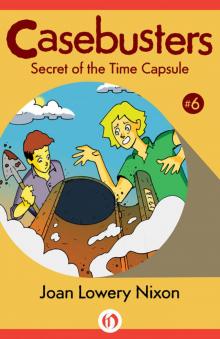 Secret of the Time Capsule
Secret of the Time Capsule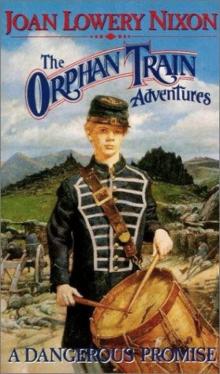 A Dangerous Promise
A Dangerous Promise Laugh Till You Cry
Laugh Till You Cry Spirit Seeker
Spirit Seeker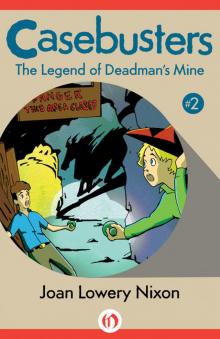 The Legend of Deadman's Mine
The Legend of Deadman's Mine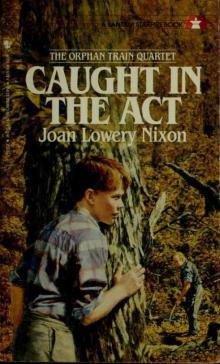 Caught in the Act
Caught in the Act Check in to Danger
Check in to Danger Ellis Island: Three Novels
Ellis Island: Three Novels The Name of the Game Was Murder
The Name of the Game Was Murder The Haunting
The Haunting Lucy’s Wish
Lucy’s Wish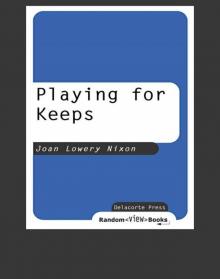 Playing for Keeps
Playing for Keeps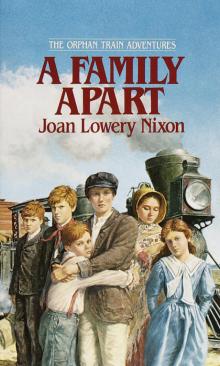 A Family Apart
A Family Apart Nobody's There
Nobody's There Shadowmaker
Shadowmaker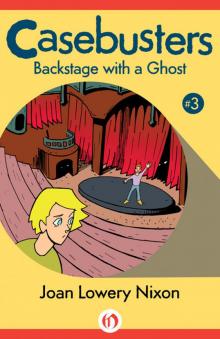 Backstage with a Ghost
Backstage with a Ghost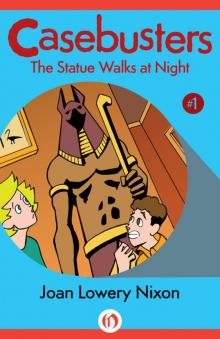 The Statue Walks at Night
The Statue Walks at Night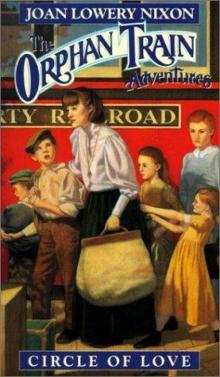 Circle of Love
Circle of Love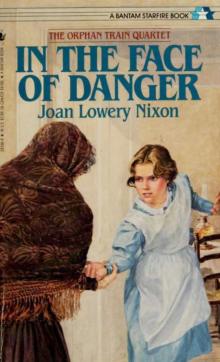 In the Face of Danger
In the Face of Danger Ghost Town
Ghost Town A Candidate for Murder
A Candidate for Murder The Weekend Was Murder
The Weekend Was Murder The Island of Dangerous Dreams
The Island of Dangerous Dreams The Ghosts of Now
The Ghosts of Now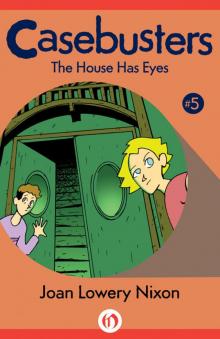 The House Has Eyes
The House Has Eyes The Dark and Deadly Pool
The Dark and Deadly Pool Keeping Secrets
Keeping Secrets Secret, Silent Screams
Secret, Silent Screams Beware the Pirate Ghost
Beware the Pirate Ghost Search for the Shadowman
Search for the Shadowman Haunted Island
Haunted Island